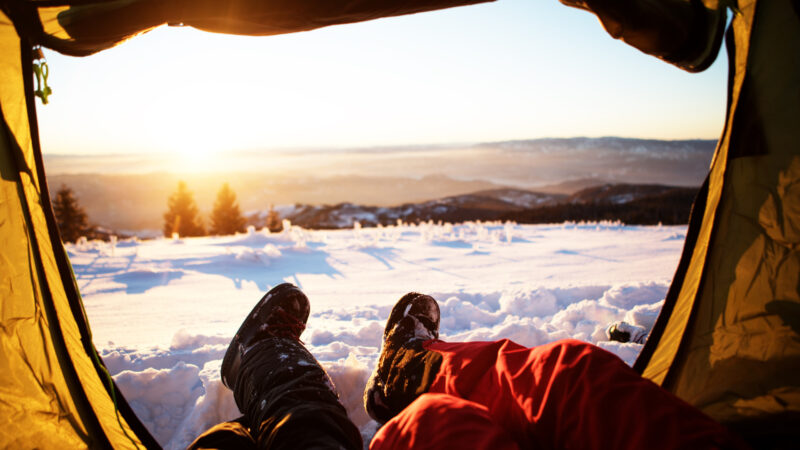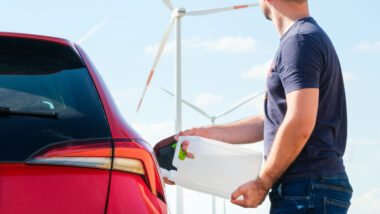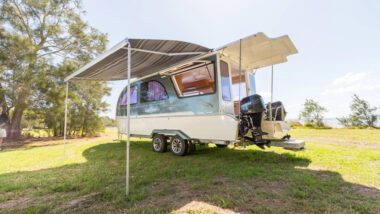Table of Contents Show
There’s something special about seeing the hoodoos of Bryce Canyon National Park or the red sandstone arches of Arches National Park powdered with snow.
Even without the snow, hiking and backpacking in some of the most-visited National Parks during winter is ideal to avoid crowds.
If you’re considering pitching a tent this winter, here are a few winter camping tips to make your experience safe, warm, and enjoyable.
Let’s dive in!
How Cold Is Too Cold to Camp?
Unless you are a very experienced tent camper, you shouldn’t camp in temperatures under 40 degrees.
So if the weather forecast for the weekend says the nightly lows will be around freezing, it’s a good idea to cancel your weekend camping trip.
You should also consider the elevation. Even though the daytime temperatures may be comfortable, the nighttime temperatures drop dramatically the higher in elevation you go because of the lower air pressure.
Can You Survive Winter in a Tent?
This all depends on where you spend winter. If you’re tent camping in Florida, it’s likely the temperatures won’t dip below 40 degrees, and you can comfortably enjoy winter tent camping.
This also depends on your experience and gear. If you’re a serious backpacker and have the budget to buy top-quality equipment, it’s possible to tent camp year-round.
The quality of your tent, sleeping bag, and other camping gear will determine your survival during the winter. Our winter camping tips below can help with your survival.
How Do You Comfortably Camp in the Winter?
Two keys to camping comfortably in the winter are staying dry and warm. Your tent and sleeping bag are the two most important pieces of gear that will either make or break your experience.
You’ll want to invest in a more expensive and durable canvas tent instead of a nylon one. The tent should also be well-ventilated to avoid condensation.
You’ll also want to buy a sleeping bag rated for the coldest temperatures.
Finding a small heater and keeping your tent closed at all times will help you stay dry and warm during the winter.
Winter Camping Tips You’re Going to Want to Know
Here are a few specific winter camping tips to help you camp comfortably in the coldest time of the year.
Staying dry and warm is crucial, but there are other important things to remember and prepare for in advance to make your camping experience enjoyable.
1. Dress in Layers
It’s easy to stay warm when you’re out hiking or backpacking during the day. But once you stop moving, it will get cold quickly. Dress in layers to protect yourself from a dramatic change in temperature.
Use polyester thermal underwear for the base layer, then select a breathable fleece layer. Don’t leave your tent without a neck gaiter, scarf, or jacket.
You’ll want the jacket to be waterproof and breathable for the most comfort. Finally, use wool instead of cotton for caps and socks.

2. Stay Dry and Have a System for Wet Clothes
Your goal is to stay dry during the winter, and this winter camping tip can help. But there will be days when your clothes get wet, either by accident or on purpose.
Have a system for hanging wet and sweaty clothes. You want them to dry as quickly as possible and separate them from your other dry clothes.
Breathable materials like synthetics and wool are better than cotton because they dry much faster.
3. Purchase Cold-Weather Sleep Gear
Just like when you’re out hiking or backpacking, you also want to wear layers to bed. No matter what you’ve heard, sleeping naked in a sleeping bag doesn’t keep you warm.
Synthetic and wool are still the best options to offer warmth and breathability.
You don’t want tight-fitting clothes that might restrict blood flow. Consider adding a cap, gloves, and socks when you get into your sleeping bag for added warmth.
In addition to the clothes you wear, the quality and rating of your sleeping bag are also important. But it’s not enough.
You need to have a quality, insulated pad underneath it to retain your body heat. Spend the money to buy a cold-weather sleeping bag and sleeping pad.
- Keep Warm: Backpacking sleeping bag Filled with 1.1lbs 600 FP premium duck down, comfort temperature 41°F-54°F, limit...
- Lightweight & Portable: The ultralight sleeping bag Weighs only 2.69 lbs, pack size 13.8" x 6.7", lighter and more...
4. Stay Hydrated and Eat a Lot
It’s easy to remember to stay hydrated when it’s hot in the summer. But it’s just as important to stay hydrated in the winter. You might not feel thirsty, but you must drink water.
Dehydration will take a toll on your body when winter is already wreaking havoc on your immune system.
Don’t get caught up in drinking just coffee or hot chocolate because it’s cold outside. Keep your caffeine intake at a minimum and keep a bottle of water nearby.
Just like staying hydrated, you also want to keep your caloric intake strong. If you’re planning one backpacking trip after another, you want to have the energy to complete those exciting adventures.
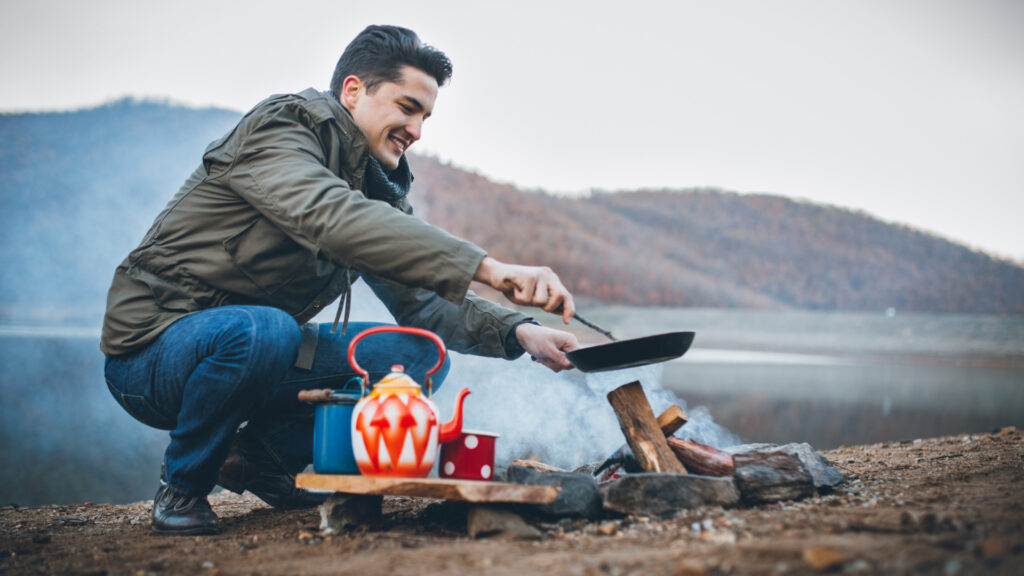
- Premium Insulated Bottle: Made of 18/8 Food-grade Stainless Steel that’s non-toxic, BPA-free, and odorless, these...
- Functional Sports Bottle: These water bottle comes with 3 useful lids. Flip straw lid is for hands-free sipping when...
5. Vent Your Tent or RV to Prevent Condensation
When the inside of the tent is warm and you’re breathing out warm air, there will be condensation. It’s impossible to avoid it altogether.
But by being proactive and following this winter camping tip, you can reduce its effects.
Dry out your sleeping bag before you use it again. To reduce condensation, you can vent your tent at night. You might get a bit colder, but it will help keep moisture out of your tent.
Keep in Mind: Not only do you need the right winter camping accessories, but you also need the right RV. These are some of the best Cold Weather RVs!
6. Bring a Portable Heater
You want an efficient portable heater that’s also safe. Know the size of your tent space and the power of your heater.
Gas-powered heaters won’t require a generator or power cord, so tent campers often use them.
Go ahead and get a carbon dioxide (CO₂) detector as well. It will add peace of mind. You’ll always want proper ventilation when using a gas-powered heater, so make sure a flap is open or keep a zipper unzipped.
- 2 in 1 heater fan: This ceramic heater provides two heat levels, 1500W or 750W and one cool air fan, you can use it both...
- Multi protection safety system: These heaters are made of flame retardant material avoiding any fire hazard. Automatic...
- 【Mini Air Quality Monition】The Air Quality Monitor is small and portable, easy to carry around as a decoration, and...
- 【Multifunctional Carbon Dioxide Tester】This 3 in 1 CO2 monitor can detect real-time CO2 concentration, and monitor...
7. Choose Your Campsite Wisely
When camping in the winter, it’s essential to follow this winter camping tip. Pay attention to the layout and location of your campsite. If it floods easily with rain or snowmelt, you’ll want to choose another site.
Find a site with good drainage close to a water source since you’ll need access to water for cooking, washing, and drinking.
Some shade is okay, but you might want to avoid a completely shaded spot to allow the sun to warm up your living space during the day.
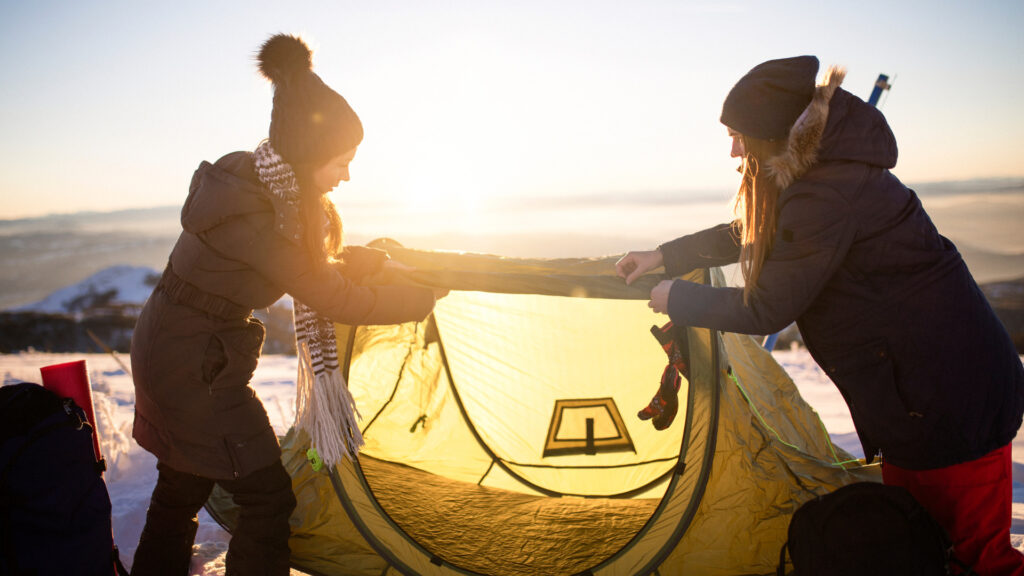
8. Put Hand Warmers Inside Your Sleeping Bag
You can throw in a few hand warmers inside your sleeping bag before you get in for the night. Just make sure to remove them, as you don’t want prolonged exposure to your skin.
You can also do light exercise right before you snuggle up and eat a few high-carb snacks. These increase your body temperature before you hit the hay for the night.
- SAFE, NATURAL LONG-LASTING HEAT - Odorless, Disposable, Single-Use Item, Do Not Apply Directly to The Skin. TSA...
- TO ACTIVATE - Remove warmer from outer package, shake to activate. Warmer heats up in 15-30 minutes. If heat decreases,...
9. Use Two Sleeping Pads
When your body contacts the ground, you open up a conduit for heat loss. This is called conduction. Because the ground is much bigger than you, it will suck up all the heat your body can produce.
An efficiently insulated sleeping pad between you and the cold, hard ground will keep you comfortable and warm. Double up the sleeping pad for added comfort and warmth.
Pro Tip: Be prepared this winter for your camping trips with the right winter Camping Gear for Cold Weather!
- Inflatable sleeping pad provides extra cushioning on camping trips
- Soft, tufted design provides an extra layer of padding between your sleeping bag and the ground
10. Answer When Nature Calls
Did you know that your body uses energy to heat your urine? These are valuable calories being used to store urine in your bladder.
So always use the bathroom right before bedtime. Anytime nature calls, it’s best to answer it.
Stay Safe and Warm While Winter Camping
Winter camping is possible, but it requires preparation. Stay safe, dry, and warm this winter season while still exploring and adventuring by following these winter camping tips.
It’s a stark contrast when you visit the same area where wildflowers filled the meadows of the Pacific Northwest in spring when you decide to camp there in the winter.
It’s a different beauty, a different serenity. But it’s worth it.
Will you be winter camping this year?
Last update on 2024-12-26 / Affiliate links / Images from Amazon Product Advertising API




